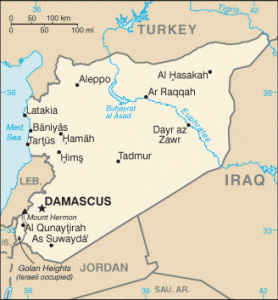The Syrian opposition has been promised western military support as soon as they can consolidate a new rebel coalition and enforce accountability on the rebel fighters.
 The new National Coalition, which claims to represent 90% of Syrian opposition groups, was set up by the United States and participated in a conference in Qatar this month in order to boost confidence in a Syrian opposition.
The new National Coalition, which claims to represent 90% of Syrian opposition groups, was set up by the United States and participated in a conference in Qatar this month in order to boost confidence in a Syrian opposition.
“We have assuaged a lot of the concerns and fulfilled a lot of preconditions on the Syrian armed opposition in terms of accountability and unity, and I believe the international community is ready to invest in the opposition both militarily and politically,” said Yaser Tabbara, a coalition spokesman. “That is the sense we got in Doha.”
Tabbara said the new opposition coalition will be asking for heavy armaments and anti-aircraft weapons in order to fight the regime of Bashar al-Assad.
The US, Britain, and France are officially reviewing their policies of not directly sending lethal aid to the Syrian rebels. But the concerns about weapons getting into the hands of Islamic jihadists and militants fighting under the banner of al-Qaeda remain unaddressed.
The former UN envoy to Syria, Kofi Annan, is among the most knowledgable of Syria’s internal situation and political realities. Annan has repeatedly warned not only against direct military intervention, but also against foreign meddling and arming of insurgent and rebel groups by various countries, arguing such measures would only worsen the situation.
And even as the leadership in the US military readily acknowledges that lack of viable options as far as direct military action go, it’s also true that arming the rebels is not likely to improve the situation – even putting aside the fact that the rebel opposition is shot through with Islamic extremists.
As Prof. Eva Bellin and Prof. Peter Krause in the Middle East Brief from Brandeis University found in their study of the Syria situation: “The distillation of historical experience with civil war and insurgency, along with a sober reckoning of conditions on the ground in Syria, make clear that limited intervention of this sort will not serve the moral impulse that animates it. To the contrary, it is more likely to amplify the harm that it seeks to eliminate by prolonging a hurting stalemate.”


